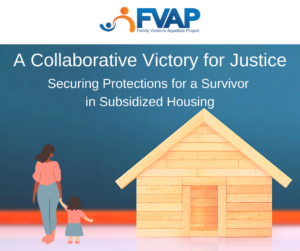FVAP successfully requested publication of this case that will provide guidance throughout the state to trial courts deciding whether to remove children from the survivor parent solely because of the abuse endured. In re B.H. establishes that the mere fact a DV survivor parent who sought out (and was granted) a DV restraining order (DVRO) in the past does not mean that they or their children are being exposed to ongoing DV. The trial court in this case was wrong to find B.H. had not protected her kids from her abuser simply because she obtained a DVRO against him following a recent incident of abuse.
Several published appellate cases have found that DV in the home supports a finding of dependency jurisdiction and removal of children from a DV survivor’s custody on the theory that they “failed to protect” the children from being exposed to DV. In re B.H. now gives critical guidance to trial courts on the “failure to protect” standard in dependency proceedings, clarifying a survivor’s continued contact with their abuser to co-parent after an incident of DV does not constitute a failure to protect provided there is no further abuse. This decision counters other current case law suggesting that separated parents alone does not eliminate the risk of DV, especially when ongoing interactions continue because of their children. (In re L.O. (2021) 67 Cal. App. 5th 227, 240). Survivors are often blamed for their abuse, and held to unreasonable standards for what they must do to keep their children safe., In re B.H. will help survivors argue that they can and should be allowed to safely parent their children.
Congratulations to FVAP attorneys Jennafer Dorfman Wagner, Arati Vasan, and FVAP law clerk, Alisa McKissick for championing this publication request. FVAP would also like to thank the 17 domestic violence organizations, legal aid organizations, public interest organizations, and academics who joined our publication request.



